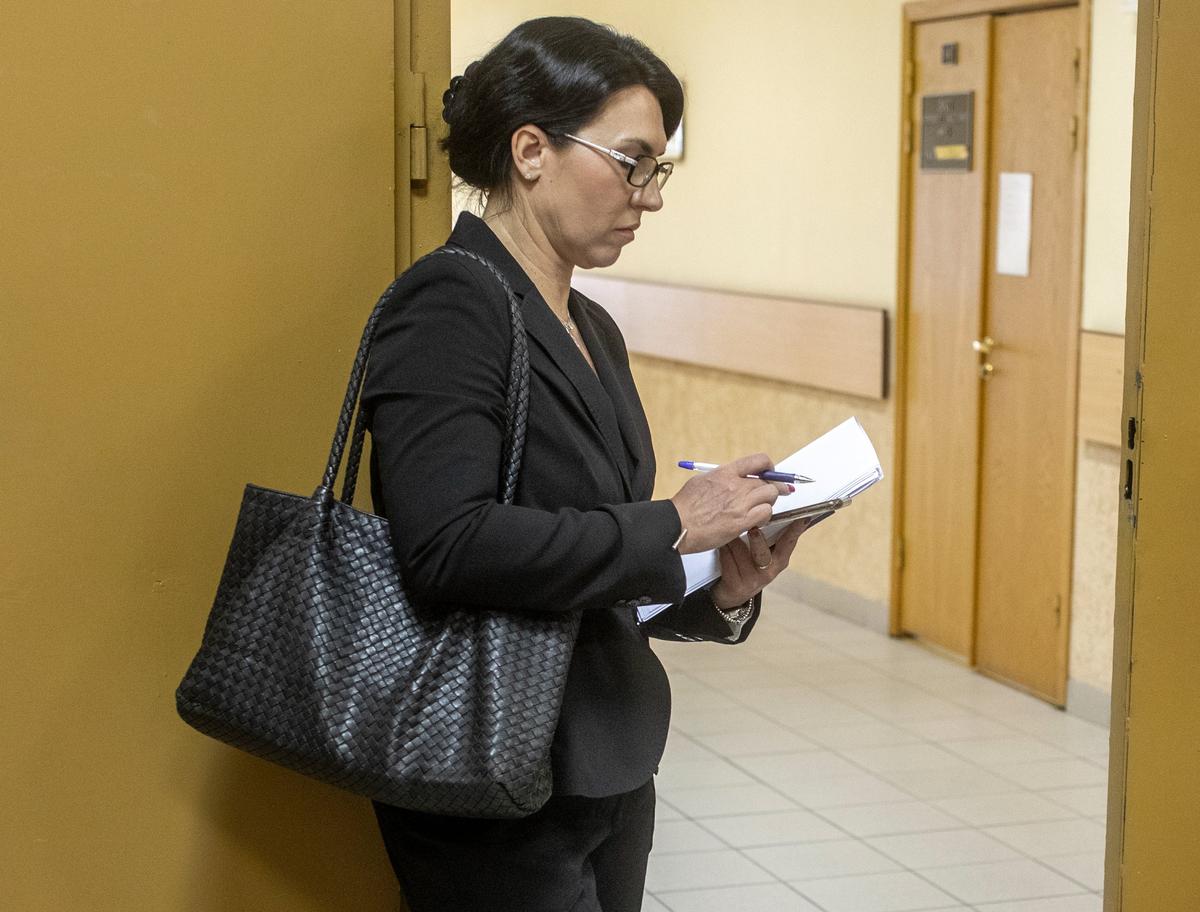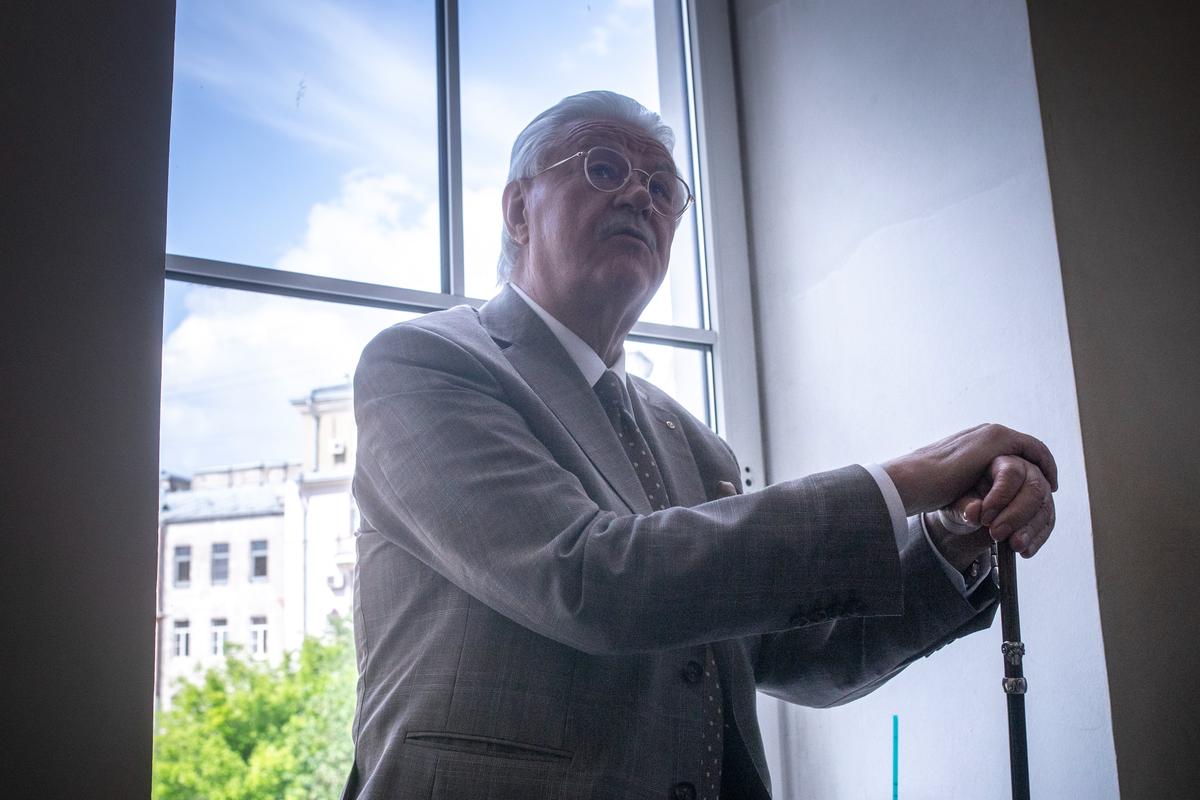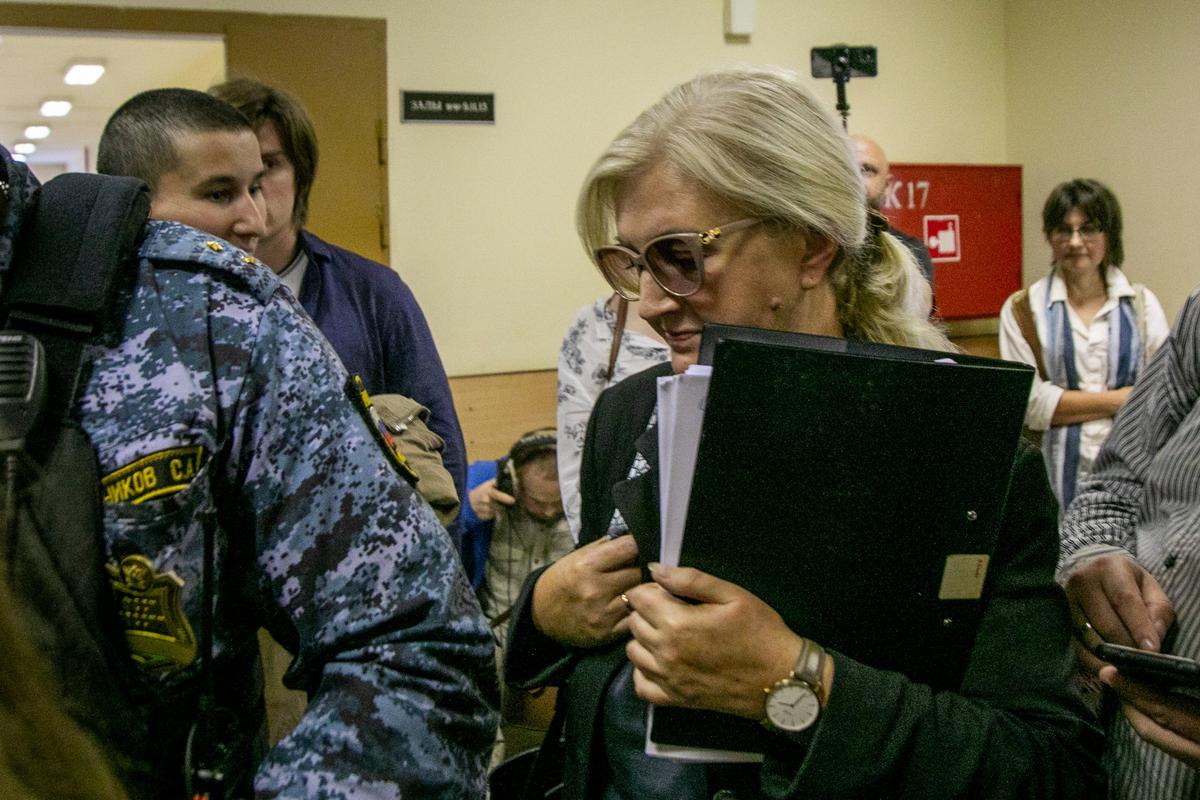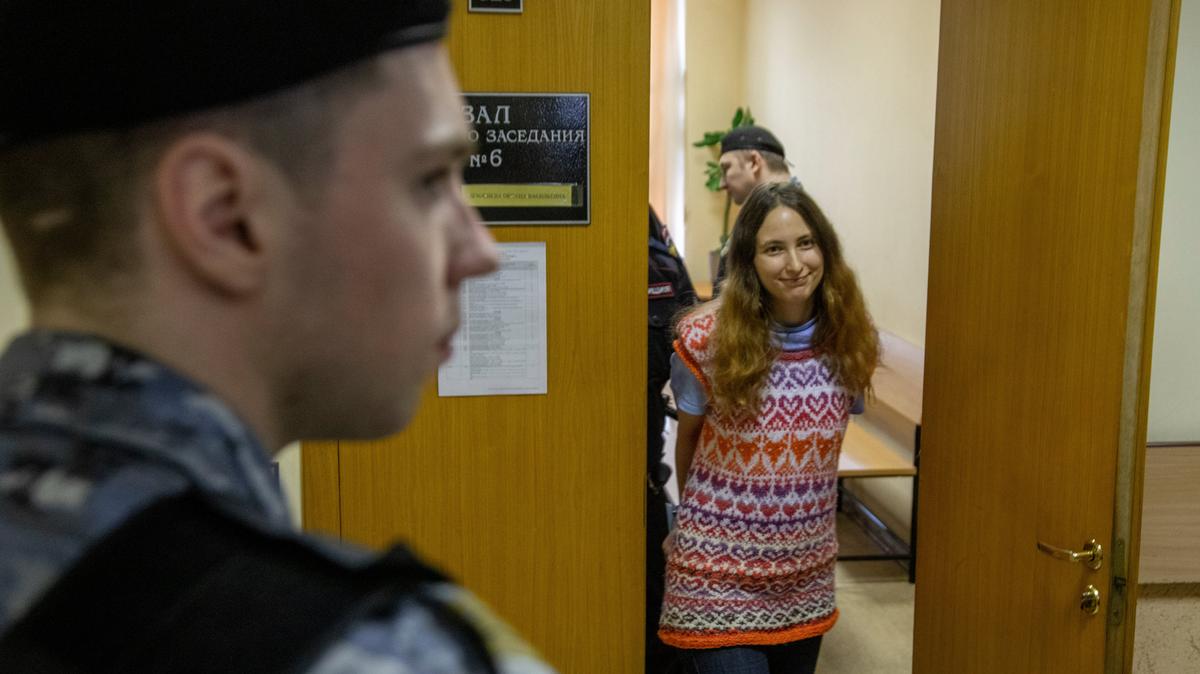A court in St. Petersburg extended the arrest of Sasha Skochilenko on Monday, allowing the authorities to continue holding the artist, who was detained for disguising anti-war messages as supermarket price tags during the early days of the war, until 10 January.
Skochilenko, who suffers from celiac disease, a heart defect and PTSD, is seeing her health swiftly deteriorate after spending a year and a half in a pre-trial detention centre where she is sometimes denied prescribed medications and is unable to follow a doctor-ordered diet, her legal team have warned.
The 33-year-old comic book writer and artist faces up to 10 years in prison for her act of protest last year. The court has summoned professional linguists to determine whether the slogans Skochilenko wrote constitute “deliberately false information about the Russian army” which could “incite hatred toward military personnel, government agencies, and the President of the Russian Federation”.
In March 2022, Skochilenko left tags she printed herself on items at her local supermarket, each one displaying one of five messages about the war in Ukraine:
- “The Russian army bombed an art school in Mariupol. Around 400 people were hiding inside.”
- “Russian conscripts are being sent to Ukraine. The price of this war is the lives of our children. Stop the war!”
- “In the first three days, 4,300 Russian soldiers were killed. Why is the media keeping silent about this?”
- “Putin has been lying to us on TV for 20 years. Now we’re prepared to justify the war and pointless deaths.”
- “My great-grandfather did not fight in WWII for four years so that Russia could become a fascist state and attack Ukraine.”
A few weeks later, Skochilenko was arrested. Law enforcement agents reportedly hacked a Telegram account belonging to her friend Alexey Nikolaev and wrote a message to Skochilenko asking her to meet him at his apartment. When Skochilenko arrived, the police were waiting for her.
Skochilenko has now been held in a pre-trial detention centre for a year and a half. The official proceedings began 10 months ago, and if she is found guilty, Skochilenko will face a minimum term of five years in prison. If the judge decides that Skochilenko’s actions were “motivated by hatred or animosity for a group of people”, the sentence could be as long as 10 years.

Olga Safonova. Photo: Dmitry Tsyganov for Novaya Gazeta Europe
The court has summoned two experts — linguist Anastasia Grishanina and political scientist Olga Safonova — to analyse the messages on the price tags for proof of “hatred or animosity” and “deliberately false information”. Both experts were supposed to appear at Skochilenko’s trial in June, but they both “fell ill” immediately before the court date.
Since then, Grishanina and Safonova have both testified; Skochilenko’s lawyers questioned them for five hours each.
Safonova claimed that Skochilenko’s price tags constituted “deliberately false information” because the statements and statistics had been sourced from independent news outlets rather than the Ministry of Defence. “All information about the special military operation that does not come from the Ministry of Defence is a lie,” Safonova said.
She drew the court’s attention to price tag number 5 as a more specific example of “false information”. “The Russian Federation is not a fascist state,” Safonova said. “A fascist state is totalitarian, and Russia is democratic. I hope no one doubts this?”
“Maybe Sasha called Russia a ‘fascist state’ because it attacked Ukraine?” Skochilenko’s lawyer, Yury Novolodsky, rebutted.
“The Russian state did not attack Ukraine!” Safonova corrected him. “Russia was only defending the DPR and LPR,” referring to the self-proclaimed Donetsk and Luhansk “People’s Republics” in eastern Ukraine.
Grishanina failed to turn up at the June hearing and appeared 45 minutes late for the September hearing. She echoed Safonova’s argument that all information about the war is “false” unless it is taken from the Ministry of Defence. To address the question of “hatred or animosity”, Grishanina explained that she had analysed not only the text on the tags themselves but also Skochilenko’s testimony from earlier in the proceedings. She read out a statement in which the defendant had said that she “communicated with friends in Ukraine” and believed “the Ministry of Defence is telling lies.”

Yury Novolodsky. Photo: Dmitry Tsyganov for Novaya Gazeta Europe
Skochilenko’s defence team requested that Grishanina limit her linguistic analysis to the tags themselves. Grishanina then directed attention to the 11 verbs printed on the tags: “bombed”, “were hiding”, “are being sent”, “stop”, “died,” “keeping silent”, “has been lying”, “justify”, “participate” [in World War II], “become a fascist state”, “attack Ukraine”. Nine of the 11, Grishanina said, share a “negative” spirit and are “directed against the state”.
An independent linguistic expert, Svetlana Drugoveyko-Dolzhanskaya, asked whether passive verbs such as “were sent” could really be considered “directed against the state” since they did not specify who sent the soldiers.
“Alexandra means the president and government of Russia,”
Grishanina insisted.
When Skochilenko was permitted to speak at the end of the interrogation, she said she was “shocked” that the experts had been discussing the price tags as though she had written them herself.
“I have said more than once that I am not the author of these texts,” she said. “I saw them on the internet: there were ready-made templates of price tags with anti-war text. I thought the information on the tags was true because I’d read similar information in other sources.”

Anastasia Grishanina. Photo: Dmitry Tsyganov for Novaya Gazeta Europe
Skochilenko’s defence backed up her claim about the tags’ authorship. They pointed to another criminal case from the summer, when a woman from Izhevsk was brought to trial for re-tagging grocery products with the exact same material that Skochilenko used. The district court of Izhevsk considered the action an “administrative offence” and fined the defendant 40,000 rubles.
Yury Novolodsky, Skochilenko’s lawyer, referred to that case again after the trial. “The same exact action can’t be prosecuted as an administrative offence in one district and a criminal offence in another,” he told reporters. “Law enforcement needs to be consistent throughout the country.”
On 28 September, Skochilenko’s defence submitted an independent linguistic report prepared by Irina Levinskaya, a renowned Russian scholar who has published more than 100 scientific papers. She provided her own assessment of the price tags, calling Safonova and Grishanina’s analyses “unprofessional”.
The trial continues.
Join us in rebuilding Novaya Gazeta Europe
The Russian government has banned independent media. We were forced to leave our country in order to keep doing our job, telling our readers about what is going on Russia, Ukraine and Europe.
We will continue fighting against warfare and dictatorship. We believe that freedom of speech is the most efficient antidote against tyranny. Support us financially to help us fight for peace and freedom.
By clicking the Support button, you agree to the processing of your personal data.
To cancel a regular donation, please write to [email protected]

